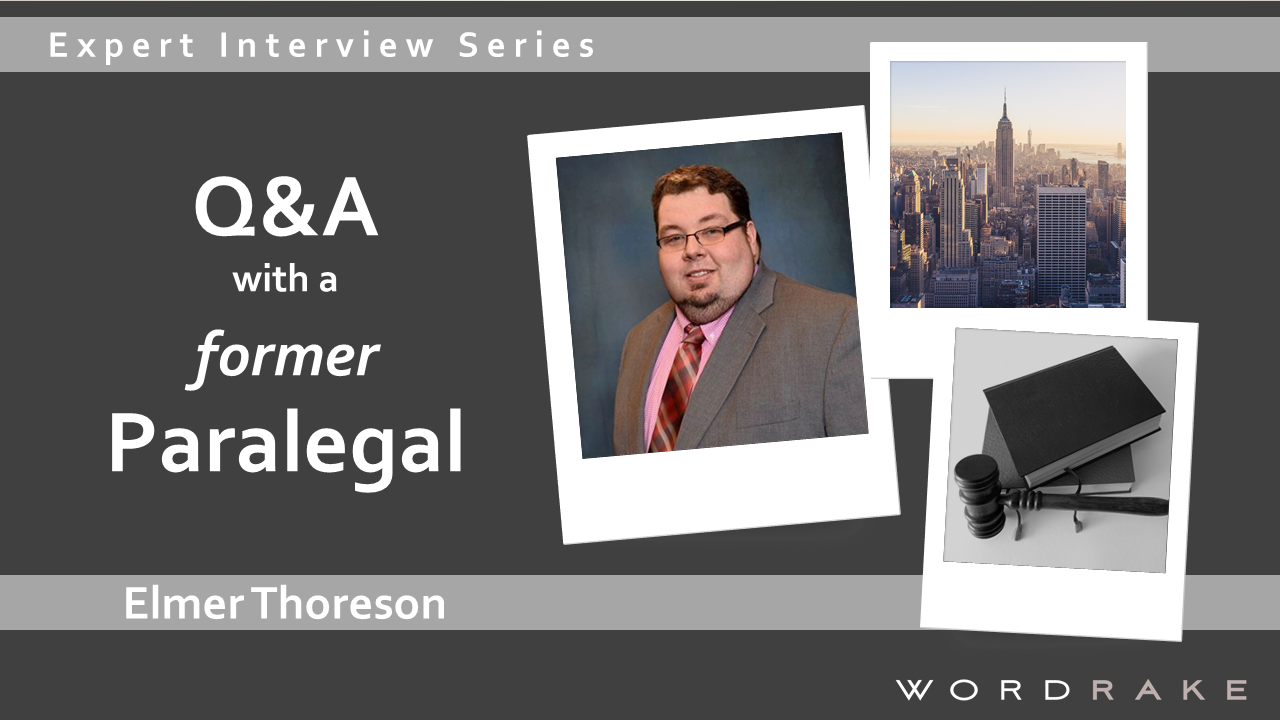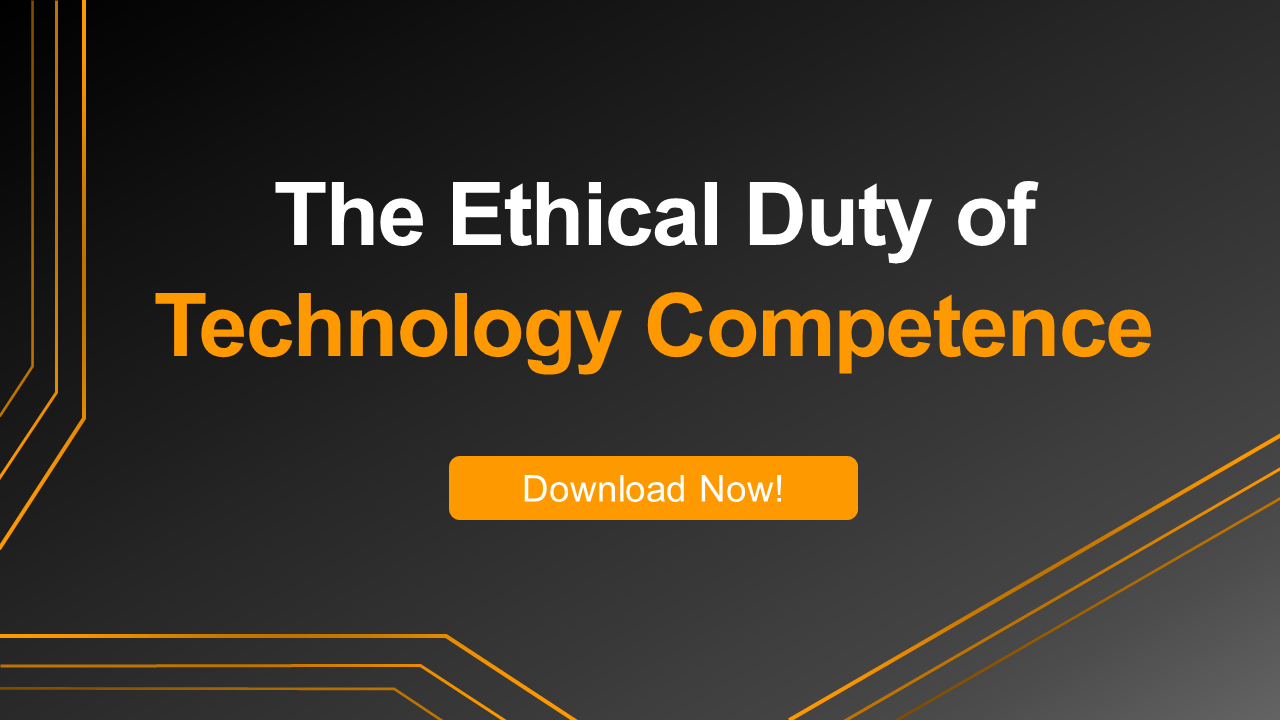Paralegals are essential but often-overlooked members of legal services teams. Because of the hierarchical nature of the legal profession, many people refuse to see how much value paralegals can contribute to a firm. That’s a mistake. In this interview with paralegal-turned-lawyer Elmer Thoreson, he uses his experiences from both roles to challenge the hierarchy. Learn from Elmer as he reveals the many ways paralegals can contribute to an effective, efficient, innovative legal practice that clients will love.
What is your role and how did you get to where you are today?
I am a lawyer with goodcounsel, LLC, and we are working on taking over the world… Actually, we work with startups. I work on entity formations and equity, and provide general counsel and advice via our Counsel-as-a-Service program. I also lead our document automation efforts where we are switching from Contract Express to ClauseBase. Our goal is for legal to be a partner instead of a barrier, so properly using technology and allied professionals is important.
Shifting from paralegal work to lawyer work, what are the biggest differences you’ve experienced?
As a paralegal, I thought lawyers knew everything, but now that I am on the other side, I realize that is not case. The biggest difference is that, when I was a paralegal and ran into a roadblock, I would go to a lawyer for answers as to how to proceed. Now, I am expected to come up with the answers. Luckily, I work with great, experienced lawyers at goodcounsel, so they can help me when I get stuck or help me fine-tune my ideas. Another difference is that, when I was a paralegal, I rarely if ever interacted with clients. Now that I am a lawyer, client interaction and client management are a big part of my job. I’m glad I enjoy working directly with clients!
Do you believe there are different expectations for technology skills between lawyers and paralegals? What are they? How do they play out?
At my current firm, we expect technological proficiency from our lawyers, so ideally there would be little difference. But I must admit that our allied professionals are better at using certain platforms than the lawyers, because their work requires they do so more often. These skills are important because there’s so much technology to learn! It seems like it would be impossible for any individual to master every platform, so it is important to identify who has the specialized skills, respect them, and request their assistance when appropriate. Many firms operate this way, but lawyers at various firms may have varying levels of respect for technological proficiency.
Do paralegals have a duty of technology competence?
If you’re asking whether there is a specific duty of technology competence enforced by an outside authority, then no. But paralegals who are not technologically competent will have difficulty finding and keeping work. First, many lawyers expect their paralegals to handle the technology issues that the lawyer does not wish to address. (Which is probably questionable given that many states have a model rule calling for technological competence.) Second, a paralegal that can use technology can generate more work product more efficiently, so they will reap the benefits of their competence and efficiency.
What are the top 3 skills a paralegal must have for success?
The best paralegals are skilled at time management, managing up, and teaching skills to others. I had a mentor when I was a paralegal who said that the job primarily consisted of herding cats, and I think she was right. The best paralegals I have worked with have a talent for keeping lawyers on track and explaining tasks or complex series of events to others.
What should a new lawyer know about working with paralegals?
Experience matters for a paralegal just as much as it does for a lawyer.
There are senior paralegals who know more about the law than a new lawyer and more about the actual nuts and bolts of legal work than many partners. Learn from the senior paralegals. Law school teaches you to think like a lawyer, a senior paralegal can teach you how to be a lawyer.
If you are working with a junior paralegal, it is likely that they are bright and eager to learn. The two of you can learn together and form a partnership that will make both of you more valuable than you would be individually.
What do you wish lawyers understood about delegation?
Describing something as fast or easy is not the same as explaining how to do it! A paralegal or new lawyer will usually be bright and eager to please, but they cannot do the work unless you tell them what it entails. Telling someone that a task is fast or easy instead of giving good, clear instructions means the task won’t be completed quickly, which will often result in a frustrated, discouraged, or angry paralegal or associate.
What role can paralegals play in project and matter management?
Paralegals are usually the ones actually filing and executing documents. A paralegal can provide valuable input about creating accurate deadlines for tasks. Additionally, a paralegal will usually have knowledge of the granular steps involved in a project, so they can be invaluable when mapping a task or improving the process.
What role does a paralegal play in the document creation process? Where can paralegals help the most?
It’s most efficient for paralegals to serve as the initial drafters for common documents. If it is a frequently used document, then paralegals can learn the process and provide a good first draft to the lawyer. A knowledgeable paralegal can reduce the time that a lawyer spends on a document, which reduces the client’s bill if the firm is using hourly billing. It also makes it easier to determine if fixed fees are possible if a firm is interested in using modern billing models for their clients. Finally, the lawyer will be freed to handle more complex matters.
How can paralegals contribute to innovation and knowledge management in law firms alongside their lawyer counterparts?
Lawyers know what needs to be done and paralegals know how it will be done. A paralegal will usually know the filing rules for different courts, how to use e-filing platforms, and how to navigate calendaring. These tasks seem simple, but they are essential for law firm efficiency. A wise firm will have paralegals document this knowledge, because this information needs to be passed on to other staff members if that paralegal goes on vacation, retires, or leaves. The creation of clear, explicit instructions and documentation of processes is important and should always include paralegals.
What advice do you have for lawyers and paralegals working together?
For lawyers, never call your allied professionals non-lawyers. I understand sometimes the distinction between someone with a law license and without a law license matters. However, this term is very othering and your allied professionals will be far less likely to give you valuable input and suggestions if you spend your time telling them what they are not.
For paralegals, don’t be afraid to ask lawyers questions. The lawyers have many things on their minds; if they don’t tell you something, it is likely because they are distracted or it slipped their mind. If you ask a question when in doubt, it will likely decrease the work for the lawyer later; you will both appreciate it.
Also, you should not have to tolerate a jerk. Many lawyers appreciate paralegals, so find someone who will appreciate your skills.
How did your paralegal experience help you prepare for law school success?
My law school class included many experienced paralegals. We became sought after by our classmates for (i) our organizational skills and (ii) the fact that we had some previous knowledge about the law. Also, I noticed the paralegals were more willing to ask questions than other students, which I think is a valuable contribution. They also had the skills to nudge study groups into more focused and efficient discussions.
About Elmer Thoreson
Elmer Thoreson has been working with goodcounsel, LLC since February, 2019. He was admitted to the bar of Illinois in November 2019. He assists startups and early-stage companies with matters ranging from formation to equity allocation to general counsel services. Before attending law school, Elmer worked as a paralegal for a statewide law firm in Indiana for almost 7 years. He currently focuses on modern legal billing, process improvement, and effective use of document automation.
About the Paralegal Interview Series
This interview is part of a collection of interviews about paralegal work. By producing this series, we hope to shine a light on some of the most important but often undervalued people in law: paralegals. Paralegals are key contributors to a high-value legal practice and are more effective when they’re empowered. Let’s start working better together.
Nearly everyone working in a law firm writes, and that writing must be done well. WordRake can help produce better, clearer documents in less time. WordRake is clear and concise editing software designed for people who work with confidential information. The software improves writing by simplifying and clarifying text, cutting legalese, and recommending plain English replacements. WordRake runs in Microsoft Word and Outlook, and its suggestions appear in the familiar track-changes style. Learn more about our paralegal program and our 2-week enterprise pilot. Or try an individual license of WordRake for free for 7 days.







